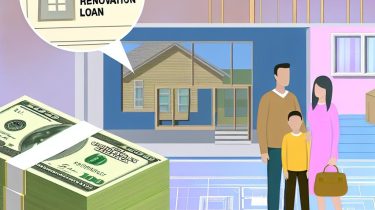What is a renovation loan, and when to consider one?

Understanding Renovation Loans
A renovation loan is a form of financial aid designed to help homeowners enhance and upgrade their properties. These loans serve as a viable solution for homeowners aiming to increase their property value and for buyers investing in real estate requiring immediate improvement. Given the substantial financial outlay involved in home renovations, understanding the nuances of these loans becomes essential.
Types of Renovation Loans
The market offers a variety of renovation loans, each with distinct characteristics tailored to specific needs. These loans can range from government-backed options to more general personal loans.
FHA 203(k) Loan: The FHA 203(k) loan stands out as a government-backed option provided by the Federal Housing Administration. This loan allows homeowners to incorporate both purchase and renovation costs into a single mortgage. It proves exceptionally beneficial for buyers acquiring properties that require significant repair work. The FHA 203(k) loan permits a broad range of renovations, from structural alterations to simple cosmetic upgrades, making it versatile for diverse homeowner needs.
HomeStyle Renovation Loan: Offered by Fannie Mae, the HomeStyle Renovation Loan provides funding for both structural and non-structural enhancements. Unlike some renovation loans limited to primary residences, this option extends coverage to second homes and investment properties as well. Consequently, it appeals to a broader audience by delivering greater flexibility. The HomeStyle Renovation Loan allows for comprehensive modifications, whether the work involves crucial infrastructural improvements or more superficial changes.
Personal Loans: While not exclusively crafted for property renovations, personal loans offer another avenue for financing. Beneficial for those requiring quick access to funds, personal loans are often approved faster and do not necessarily demand property equity as collateral. However, potential borrowers should be aware that personal loans typically come with higher interest rates than alternatives explicitly designed for renovations. Despite these higher costs, they remain a viable option when speed is of the essence or when property equity is low.
When to Consider a Renovation Loan
Deciding to pursue a renovation loan warrants careful deliberation. Certain situations naturally incline toward the necessity of such financial products:
Increasing Property Value: One primary reason for considering a renovation loan is the potential augmentation of the property’s market value. Upgrading your residence doesn’t just offer immediate personal comfort; it may also significantly enhance resale value. If the intent is to sell the property soon after improvements, calculating the probable increase in market value is critical to determine financial viability.
Purchasing a Fixer-Upper: For potential homeowners purchasing fixer-uppers, renovation loans offer a strategic solution to capitalize on such opportunities. They not only facilitate the acquisition by merging the purchase and renovation costs into a single loan but may also result in manageable monthly payments due to potentially favorable interest rates.
Limited Cash on Hand: Renovation projects often involve substantial expenditures, more than savings can cover. For individuals or families with limited cash reserves, renovation loans spread costs over time, allowing access to improved living conditions without immediate financial strain. By amortizing expenditures over an extended period, these loans present a manageable and sustainable financial commitment.
Considerations Before Applying
Before embarking on the application process for a renovation loan, several preparatory steps should be undertaken:
Budgeting: Meticulous budgeting stands principal in ensuring one’s ability to cope with additional debt arising from a renovation loan. A budget analysis can provide a comprehensive view of one’s financial capacity, preventing future difficulties. Consulting a financial advisor may offer expert insights that align with an individual’s unique circumstances and promote a sound financial strategy.
Loan Requirements: Since renovation loans possess varying requirements, your qualifications should align with the selected loan type. Crucial factors such as credit score, down payment capabilities, and eligibility for desired renovation categories need thorough evaluation. Understanding these requirements and ensuring adherence is paramount for a seamless loan procurement process.
Contractor Selection: The choice of contractor profoundly impacts renovation projects. Lenders frequently insist on employing licensed contractors, especially for extensive renovations, to mitigate risks associated with unskilled labor. Therefore, ensure that selected contractors hold a strong industry reputation and proven expertise—an assurance of achieving optimal renovation results.
Ultimately, renovation loans provide a remarkable opportunity for homeowners to transform and personalize their properties. Whether the objective is crafting a dream residence or converting a dilapidated property into a valuable asset, discerning evaluation of the various options can lead to a successful application and enjoyable renovation experience. Understanding the detailed provisions and ensuring compliance with lender stipulations prepares prospective applicants to undertake renovation projects with confidence and financial prudence.